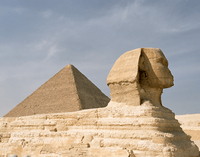It is a strange kind of republic in which presidents serve for life. It is an even stranger one in which rulers inherit power from their fathers. Yet, that is the direction in which the Arab Republic of Egypt is headed.
Egypt has experienced hereditary rule for millennia, from the pharaohs who began their reign 5,000 years ago to most (but not all) of the dynastic rulers who have called Cairo home for the last thousand years. The dissolution of the Egyptian monarchy in 1952 marked a turning point in Egyptian politics, ushering in military control and eliminating privileges that had accrued to some families over centuries.
In the five-and-a-half decades since the Egyptian revolution, army officers accrued their own privileges. They occupied senior positions in government, and they retired to senior positions in business. Formerly middle-class officers became part of the new upper class, and their children -- many of whom did not follow their fathers' footsteps into the military -- comfortably assimilated into the elite.

